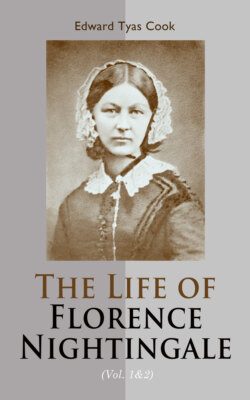Читать книгу The Life of Florence Nightingale (Vol. 1&2) - Edward Tyas Cook - Страница 14
На сайте Литреса книга снята с продажи.
VI
ОглавлениеThe fascination of social life must have been brought vividly before her during the winter (1838–39) which they spent in Paris, in apartments in the Place Vendôme (No. 22). She was now introduced into the brilliant circle of the last of the salons. Mary Clarke, afterwards Madame Mohl, was by descent half Irish, half Scottish; by education and residence, almost wholly French. “A charming mixture,” said Ampère of her, “of French vivacity and English originality.” Full at once of esprit and of espièglerie, well read and artistic yet wholly devoid of pedantry, without regular beauty of feature, but alert and piquante, Mary Clarke had gathered round her what Ticknor in 1837 had found the most intellectual circle in Paris. For seven years she and her mother lived in apartments in the Abbaye-au-Bois, adjoining those of Madame Récamier, and Mary was a daily visitor to the famous salon during the reign of Chateaubriand, whose closing years she did much to brighten and amuse. At the time when the Nightingales arrived in Paris, Mrs. and Miss Clarke had left the Abbaye-au-Bois and established themselves in those apartments in the Rue du Bac which for nearly forty years were a haunt of all that was brilliant in the intellectual life of Paris. Mary Clarke took most affectionately to the Nightingale family, who, with some of their connections, remained for long years among her closest friends. She used to pay a yearly visit to Mr. and Mrs. Nightingale, either at Embley or at Lea Hurst, generally staying three weeks or a month; and to her many of Florence's most interesting letters were, as we shall find, addressed. To her other and more superficial qualities, Mary Clarke added great warmth of lasting affection for her intimate friends, and her sympathetic kindness to the Nightingale circle was unfailing. The attraction of Paris to Florence lay principally in its hospitals and nursing sisterhoods, but partly also in that it was the home of “Clarkey,” as they called her. And it was the same with other members of the family. There is a letter from Lady Verney to Clarkey which describes how some one asked Mr. Nightingale, “Are you going to Paris?” “Oh, no,” he replied; “Madame Mohl is ill.” “Then does Paris mean Madame Mohl?” “Yes, certainly,” he replied gravely. During the winter of 1838–39 Miss Clarke, writes Lady Verney, was “exceedingly kind to Florence and me, two young girls full of all kinds of interests, which she took the greatest pains to help. She made us acquainted with all her friends, many and notable, among them Madame Récamier. I know now, better than then, what her influence must have been thus to introduce an English family (two of them girls who, if French, would not have appeared in society) into that jealously guarded sanctuary, the most exclusive aristocratic and literary salon in Paris. We were asked, even, to the reading by Chateaubriand, at the Abbaye-au-Bois, of his Mémoires d'Outre-Tombe, which he could not wait to put forth, as he had intended when writing them, until after his death—desiring, it was said, to discount the praises which he expected, but hardly received. This hearing was a favour eagerly sought for by the cream of the cream of Paris society at that time.”11 In Miss Clarke's own apartments, the Nightingales met many distinguished men. The intimates who were always there, and who assisted their hostess in making the tea, were MM. Fauriel and Mohl—Claude Fauriel, versed in mediæval and Provençal lore, a man exceedingly handsome, who had captivated Madame de Staël and other ladies besides Mary Clarke in his friendships; and Julius Mohl, one of the first Orientalists in Europe, a more ardent lover whom, after a probation of eighteen years, Miss Clarke married in 1847. M. Mohl was once asked by Queen Victoria why, loving Germany so much, he had given up his native country for France. “Ma foi, madame,” he replied, “j'ètais amoureux.” With M. Mohl, no less than with his wife, Florence Nightingale was on terms of affectionate friendship. Among the frequent visitors whom she and her sister met at Miss Clarke's were Madame Tastu (the poetess), Élie de Beaumont (the geologist), Roulin (the traveller and naturalist), Cousin, Mignet, Guizot, Tocqueville, Barthélemy St. Hilaire, and Thiers. The last-named was one of Miss Clarke's earliest admirers; and many years later, after the Franco-German war, when Thiers was at the head of affairs, Lady Verney heard M. Mohl say to his wife, “Madame, why did you not marry M. Thiers instead of me, for now you would have been Queen of France?”
In such circles as that which gathered around Miss Clarke, Florence Nightingale was well qualified to hold her own and even to play a brilliant part. Her life of gaiety on the Riviera and in Italy must have rubbed away much of the shyness from which she had suffered. If not beautiful, she was elegant and distinguished. She was both widely and deeply read. She had many and varied interests. She had powers of expression, in which clearness was not unmixed with a note of humorous subacidity. These are social advantages, and she was not without the inclination to use them. She chose in the end another path—a path which was beset by many obstacles of circumstance; but there were obstacles in herself also, and one of the last “temptations” to be overcome, before she was free to interpret her call and to act upon it, was (as she wrote in many a page of confession and self-examination) “the desire to shine in society.”
